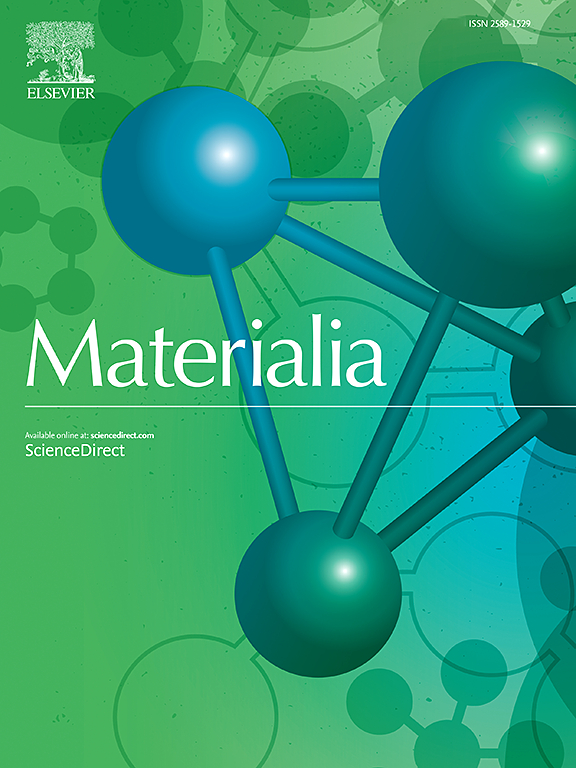质地、晶界构成和钼分区对脉冲电沉积镍钼镀层的腐蚀和氢渗透行为的影响
IF 2.9
Q2 MATERIALS SCIENCE, MULTIDISCIPLINARY
引用次数: 0
摘要
研究了脉冲电沉积镍钼涂层(2、4、8 和 11wt% Mo)的微观结构演变、电化学腐蚀和氢渗透。电化学阻抗谱和电位极化测量结果表明,在最佳钼含量下,耐腐蚀性能有所提高。纯 Ni 涂层的腐蚀电流密度 icorr 和极化电阻 Rp 值分别为 13.8 μA/cm2 和 1745 Ωcm2,而 Ni-4wt% Mo 涂层的 icorr 和 Rp 值分别为 1.7 μA/cm2 和 5406 Ωcm2。此外,当 Mo 含量超过 4 wt% 时,腐蚀速率也会增加。尽管如此,Ni-Mo 涂层的耐腐蚀性仍高于纯 Ni 涂层。镍钼涂层在固溶体基体中含有相对富集的钼簇。镍-4wt%钼涂层的耐腐蚀性能最高是由于较低能量的(001)和(111)纹理、较低能量的晶界构成以及较低的涂层应变。在镍-4wt%钼涂层中,钼富集的镍-钼纳米团簇提供了一条曲折的路径,从而抑制了氢的通过。相反,高角度晶界的高比例(与纯镍涂层相比)促进了氢的渗透,导致氢在纯镍和 Ni-4wt% Mo 涂层中的渗透程度相似。本文章由计算机程序翻译,如有差异,请以英文原文为准。

Effect of texture, grain boundary constitution, and molybdenum partitioning on corrosion and hydrogen permeation behavior of pulse electrodeposited Ni-Mo coatings
Microstructural evolution, electrochemical corrosion and hydrogen permeation in pulse electrodeposited Ni-Mo coatings (2, 4, 8, and 11wt% Mo) were investigated. Electrochemical impedance spectroscopy and potentiodynamic polarization measurements revealed improved corrosion resistance at an optimum Mo content. The corrosion current density icorr and polarization resistance Rp values obtained were 13.8 μA/cm2 and 1745 Ωcm2 respectively for pure Ni coating while the icorr and Rp values obtained were 1.7 μA/cm2 and 5406 Ωcm2 respectively for Ni-4wt% Mo coating. Further, increase in the Mo content beyond 4 wt% increased the corrosion rate. Nevertheless, corrosion resistance of Ni-Mo coatings was found to be higher than the pure Ni coating. Ni-Mo coatings contained relatively Mo-enriched clusters in a solid solution matrix. The highest corrosion resistance of Ni-4wt% Mo coating was due to lower energy (001) and (111) textures, lower energy grain boundary constitution, and low coating strain. In Ni-4wt% Mo coating, Mo-enriched Ni-Mo nanoclusters inhibited hydrogen passage by providing a torturous path. In contrast, a high fraction of high-angle grain boundaries (compared to pure Ni coating) facilitated hydrogen permeation leading to a similar extent of hydrogen permeation through pure Ni and Ni-4wt% Mo coatings.
求助全文
通过发布文献求助,成功后即可免费获取论文全文。
去求助
来源期刊

Materialia
MATERIALS SCIENCE, MULTIDISCIPLINARY-
CiteScore
6.40
自引率
2.90%
发文量
345
审稿时长
36 days
期刊介绍:
Materialia is a multidisciplinary journal of materials science and engineering that publishes original peer-reviewed research articles. Articles in Materialia advance the understanding of the relationship between processing, structure, property, and function of materials.
Materialia publishes full-length research articles, review articles, and letters (short communications). In addition to receiving direct submissions, Materialia also accepts transfers from Acta Materialia, Inc. partner journals. Materialia offers authors the choice to publish on an open access model (with author fee), or on a subscription model (with no author fee).
 求助内容:
求助内容: 应助结果提醒方式:
应助结果提醒方式:


